Nursing Assignment Case Study: Home Visit with Sallie Mae Fisher
VerifiedAdded on 2023/06/15
|6
|1163
|142
AI Summary
This nursing assignment case study discusses the problems faced by an elderly woman with hypertension and cardiac problems. The problems include safety concerns, confusion, dehydration, and hypoactive bowel movement. The possible nursing interventions include round the clock supervision, psychotherapy sessions, dietary recommendations, and spiritual counseling.
Contribute Materials
Your contribution can guide someone’s learning journey. Share your
documents today.
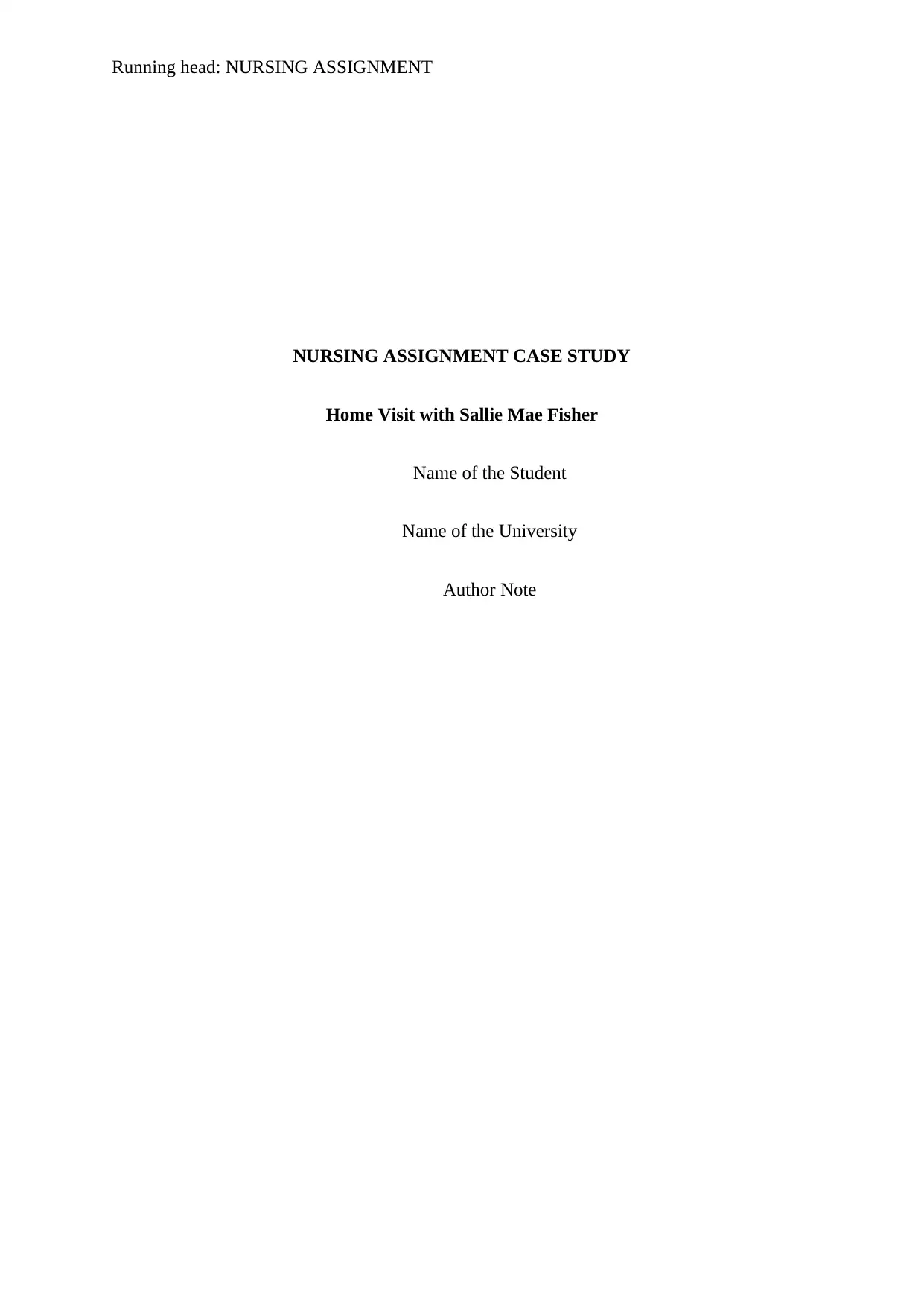
Running head: NURSING ASSIGNMENT
NURSING ASSIGNMENT CASE STUDY
Home Visit with Sallie Mae Fisher
Name of the Student
Name of the University
Author Note
NURSING ASSIGNMENT CASE STUDY
Home Visit with Sallie Mae Fisher
Name of the Student
Name of the University
Author Note
Secure Best Marks with AI Grader
Need help grading? Try our AI Grader for instant feedback on your assignments.
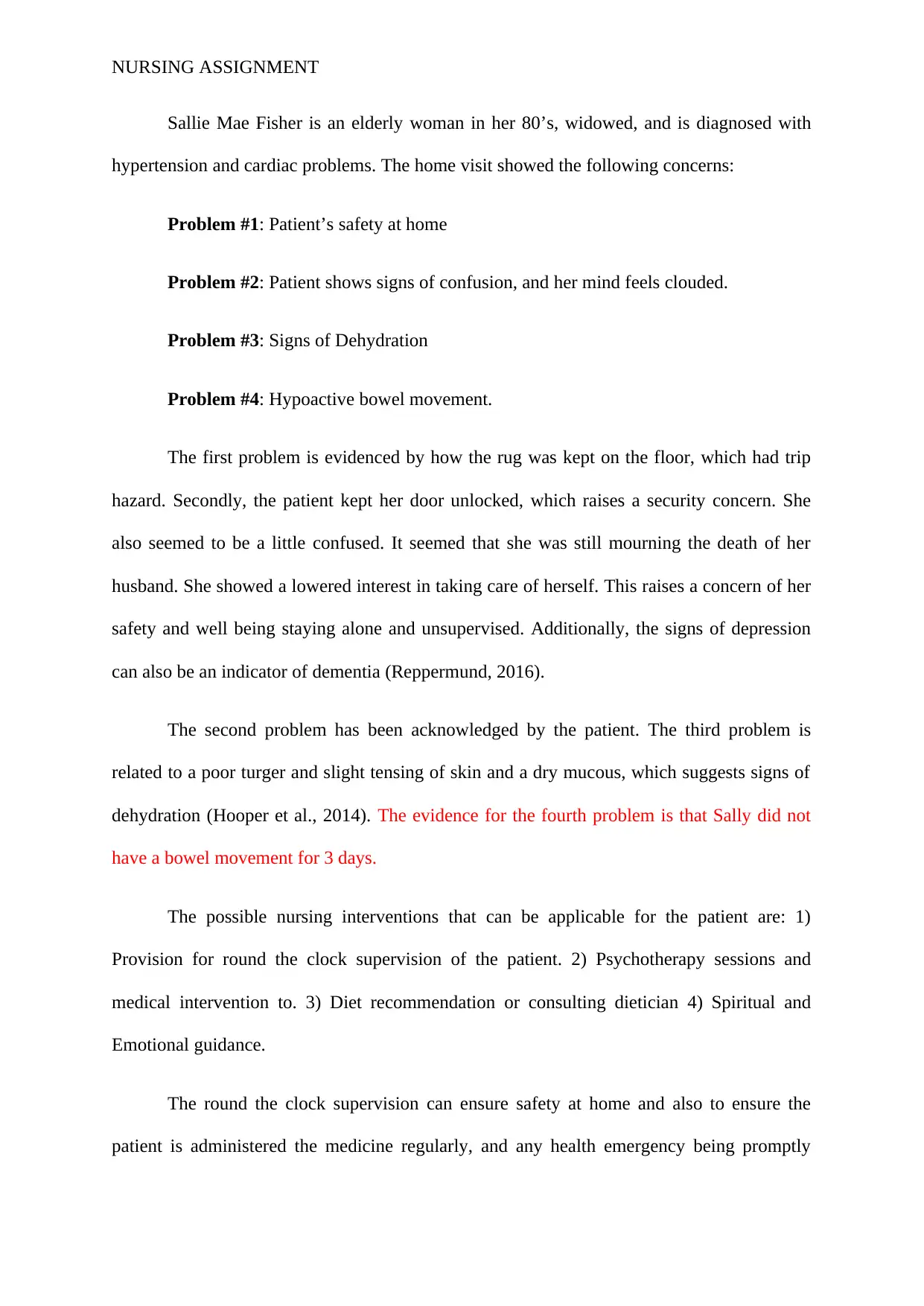
NURSING ASSIGNMENT
Sallie Mae Fisher is an elderly woman in her 80’s, widowed, and is diagnosed with
hypertension and cardiac problems. The home visit showed the following concerns:
Problem #1: Patient’s safety at home
Problem #2: Patient shows signs of confusion, and her mind feels clouded.
Problem #3: Signs of Dehydration
Problem #4: Hypoactive bowel movement.
The first problem is evidenced by how the rug was kept on the floor, which had trip
hazard. Secondly, the patient kept her door unlocked, which raises a security concern. She
also seemed to be a little confused. It seemed that she was still mourning the death of her
husband. She showed a lowered interest in taking care of herself. This raises a concern of her
safety and well being staying alone and unsupervised. Additionally, the signs of depression
can also be an indicator of dementia (Reppermund, 2016).
The second problem has been acknowledged by the patient. The third problem is
related to a poor turger and slight tensing of skin and a dry mucous, which suggests signs of
dehydration (Hooper et al., 2014). The evidence for the fourth problem is that Sally did not
have a bowel movement for 3 days.
The possible nursing interventions that can be applicable for the patient are: 1)
Provision for round the clock supervision of the patient. 2) Psychotherapy sessions and
medical intervention to. 3) Diet recommendation or consulting dietician 4) Spiritual and
Emotional guidance.
The round the clock supervision can ensure safety at home and also to ensure the
patient is administered the medicine regularly, and any health emergency being promptly
Sallie Mae Fisher is an elderly woman in her 80’s, widowed, and is diagnosed with
hypertension and cardiac problems. The home visit showed the following concerns:
Problem #1: Patient’s safety at home
Problem #2: Patient shows signs of confusion, and her mind feels clouded.
Problem #3: Signs of Dehydration
Problem #4: Hypoactive bowel movement.
The first problem is evidenced by how the rug was kept on the floor, which had trip
hazard. Secondly, the patient kept her door unlocked, which raises a security concern. She
also seemed to be a little confused. It seemed that she was still mourning the death of her
husband. She showed a lowered interest in taking care of herself. This raises a concern of her
safety and well being staying alone and unsupervised. Additionally, the signs of depression
can also be an indicator of dementia (Reppermund, 2016).
The second problem has been acknowledged by the patient. The third problem is
related to a poor turger and slight tensing of skin and a dry mucous, which suggests signs of
dehydration (Hooper et al., 2014). The evidence for the fourth problem is that Sally did not
have a bowel movement for 3 days.
The possible nursing interventions that can be applicable for the patient are: 1)
Provision for round the clock supervision of the patient. 2) Psychotherapy sessions and
medical intervention to. 3) Diet recommendation or consulting dietician 4) Spiritual and
Emotional guidance.
The round the clock supervision can ensure safety at home and also to ensure the
patient is administered the medicine regularly, and any health emergency being promptly
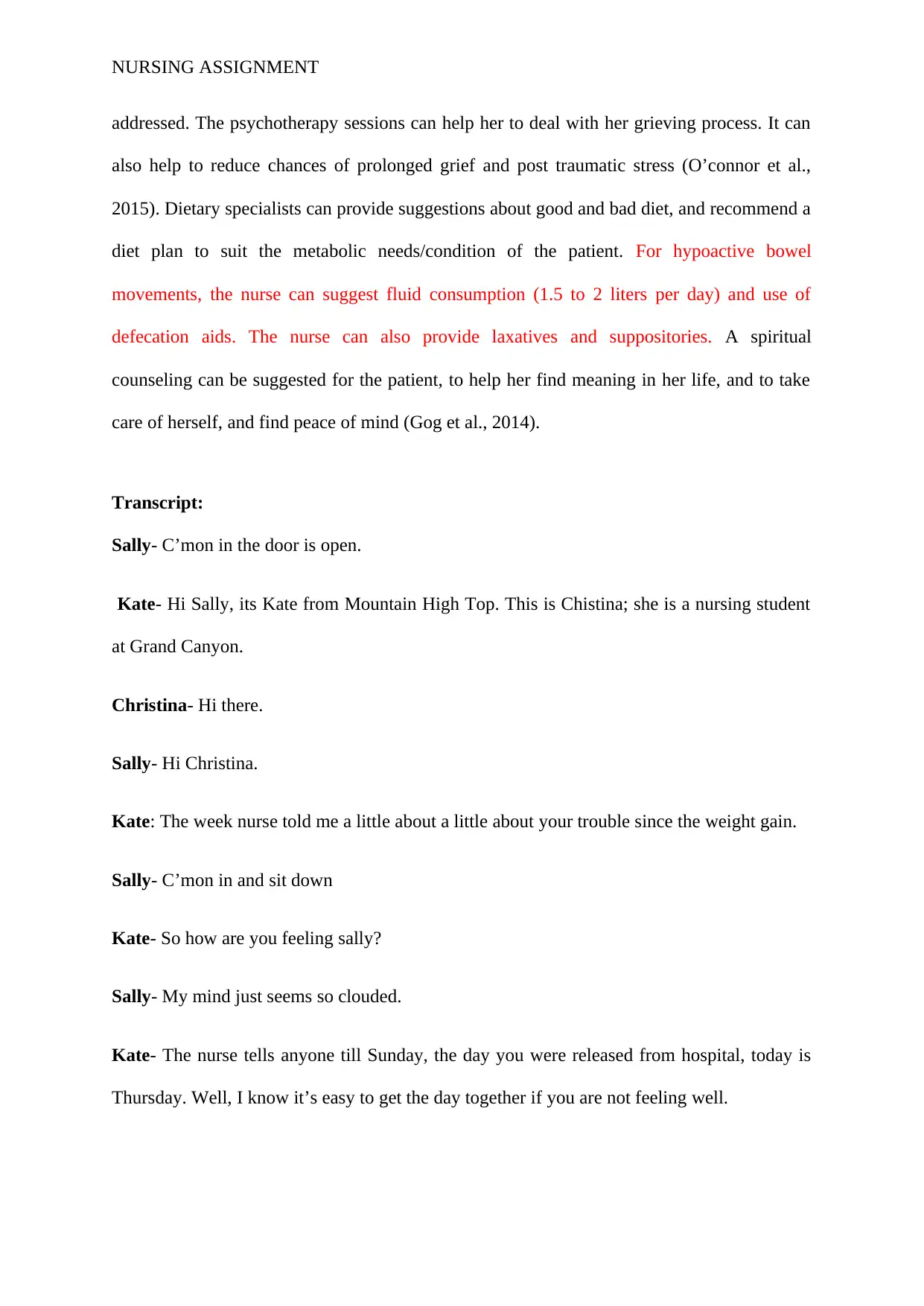
NURSING ASSIGNMENT
addressed. The psychotherapy sessions can help her to deal with her grieving process. It can
also help to reduce chances of prolonged grief and post traumatic stress (O’connor et al.,
2015). Dietary specialists can provide suggestions about good and bad diet, and recommend a
diet plan to suit the metabolic needs/condition of the patient. For hypoactive bowel
movements, the nurse can suggest fluid consumption (1.5 to 2 liters per day) and use of
defecation aids. The nurse can also provide laxatives and suppositories. A spiritual
counseling can be suggested for the patient, to help her find meaning in her life, and to take
care of herself, and find peace of mind (Gog et al., 2014).
Transcript:
Sally- C’mon in the door is open.
Kate- Hi Sally, its Kate from Mountain High Top. This is Chistina; she is a nursing student
at Grand Canyon.
Christina- Hi there.
Sally- Hi Christina.
Kate: The week nurse told me a little about a little about your trouble since the weight gain.
Sally- C’mon in and sit down
Kate- So how are you feeling sally?
Sally- My mind just seems so clouded.
Kate- The nurse tells anyone till Sunday, the day you were released from hospital, today is
Thursday. Well, I know it’s easy to get the day together if you are not feeling well.
addressed. The psychotherapy sessions can help her to deal with her grieving process. It can
also help to reduce chances of prolonged grief and post traumatic stress (O’connor et al.,
2015). Dietary specialists can provide suggestions about good and bad diet, and recommend a
diet plan to suit the metabolic needs/condition of the patient. For hypoactive bowel
movements, the nurse can suggest fluid consumption (1.5 to 2 liters per day) and use of
defecation aids. The nurse can also provide laxatives and suppositories. A spiritual
counseling can be suggested for the patient, to help her find meaning in her life, and to take
care of herself, and find peace of mind (Gog et al., 2014).
Transcript:
Sally- C’mon in the door is open.
Kate- Hi Sally, its Kate from Mountain High Top. This is Chistina; she is a nursing student
at Grand Canyon.
Christina- Hi there.
Sally- Hi Christina.
Kate: The week nurse told me a little about a little about your trouble since the weight gain.
Sally- C’mon in and sit down
Kate- So how are you feeling sally?
Sally- My mind just seems so clouded.
Kate- The nurse tells anyone till Sunday, the day you were released from hospital, today is
Thursday. Well, I know it’s easy to get the day together if you are not feeling well.
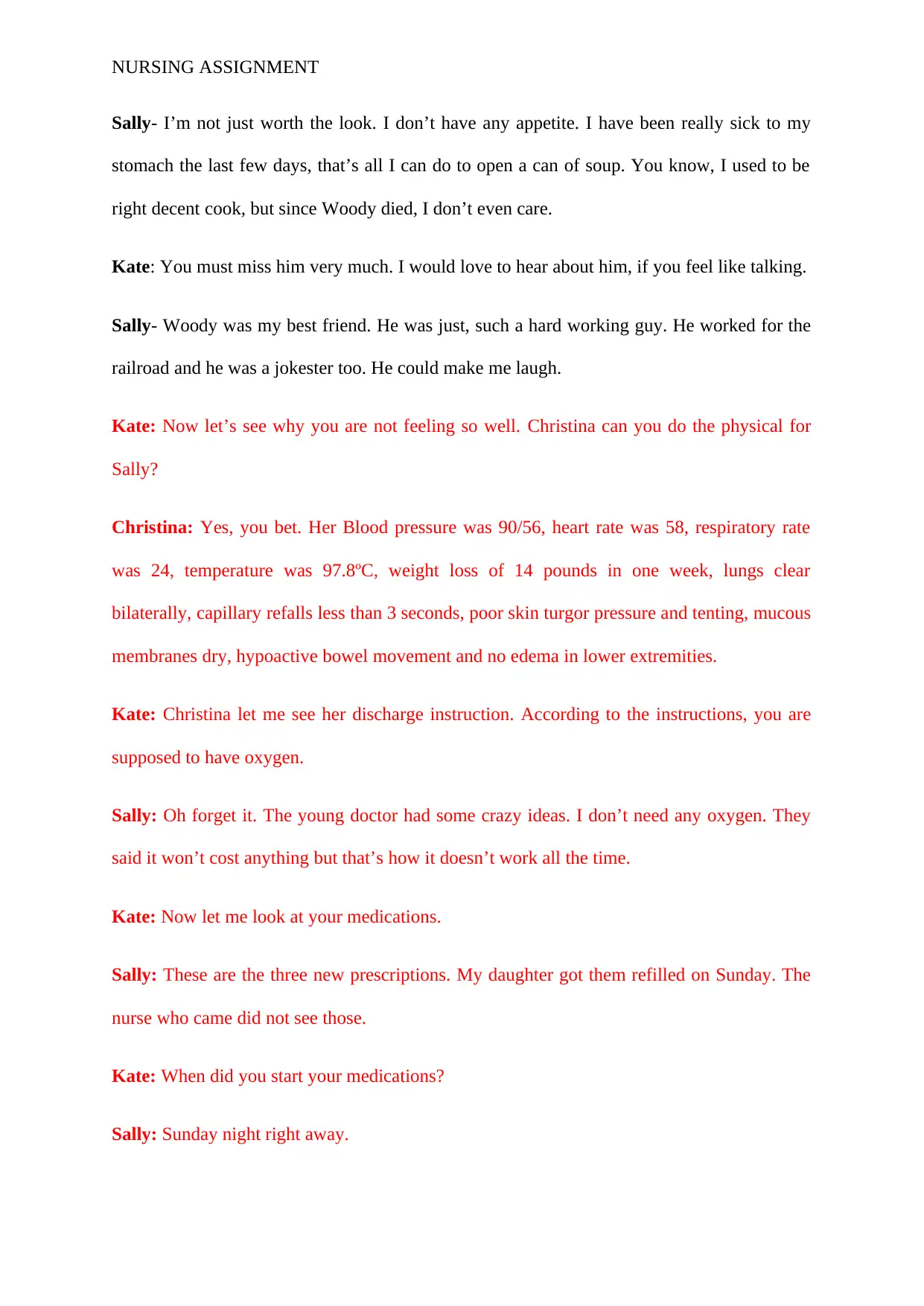
NURSING ASSIGNMENT
Sally- I’m not just worth the look. I don’t have any appetite. I have been really sick to my
stomach the last few days, that’s all I can do to open a can of soup. You know, I used to be
right decent cook, but since Woody died, I don’t even care.
Kate: You must miss him very much. I would love to hear about him, if you feel like talking.
Sally- Woody was my best friend. He was just, such a hard working guy. He worked for the
railroad and he was a jokester too. He could make me laugh.
Kate: Now let’s see why you are not feeling so well. Christina can you do the physical for
Sally?
Christina: Yes, you bet. Her Blood pressure was 90/56, heart rate was 58, respiratory rate
was 24, temperature was 97.8ºC, weight loss of 14 pounds in one week, lungs clear
bilaterally, capillary refalls less than 3 seconds, poor skin turgor pressure and tenting, mucous
membranes dry, hypoactive bowel movement and no edema in lower extremities.
Kate: Christina let me see her discharge instruction. According to the instructions, you are
supposed to have oxygen.
Sally: Oh forget it. The young doctor had some crazy ideas. I don’t need any oxygen. They
said it won’t cost anything but that’s how it doesn’t work all the time.
Kate: Now let me look at your medications.
Sally: These are the three new prescriptions. My daughter got them refilled on Sunday. The
nurse who came did not see those.
Kate: When did you start your medications?
Sally: Sunday night right away.
Sally- I’m not just worth the look. I don’t have any appetite. I have been really sick to my
stomach the last few days, that’s all I can do to open a can of soup. You know, I used to be
right decent cook, but since Woody died, I don’t even care.
Kate: You must miss him very much. I would love to hear about him, if you feel like talking.
Sally- Woody was my best friend. He was just, such a hard working guy. He worked for the
railroad and he was a jokester too. He could make me laugh.
Kate: Now let’s see why you are not feeling so well. Christina can you do the physical for
Sally?
Christina: Yes, you bet. Her Blood pressure was 90/56, heart rate was 58, respiratory rate
was 24, temperature was 97.8ºC, weight loss of 14 pounds in one week, lungs clear
bilaterally, capillary refalls less than 3 seconds, poor skin turgor pressure and tenting, mucous
membranes dry, hypoactive bowel movement and no edema in lower extremities.
Kate: Christina let me see her discharge instruction. According to the instructions, you are
supposed to have oxygen.
Sally: Oh forget it. The young doctor had some crazy ideas. I don’t need any oxygen. They
said it won’t cost anything but that’s how it doesn’t work all the time.
Kate: Now let me look at your medications.
Sally: These are the three new prescriptions. My daughter got them refilled on Sunday. The
nurse who came did not see those.
Kate: When did you start your medications?
Sally: Sunday night right away.
Secure Best Marks with AI Grader
Need help grading? Try our AI Grader for instant feedback on your assignments.

NURSING ASSIGNMENT
Kate: OK Sally, me and Christine are going to review our findings. Is that OK with you.
Sally: Yeah, its OK.
Kate: OK Sally, me and Christine are going to review our findings. Is that OK with you.
Sally: Yeah, its OK.
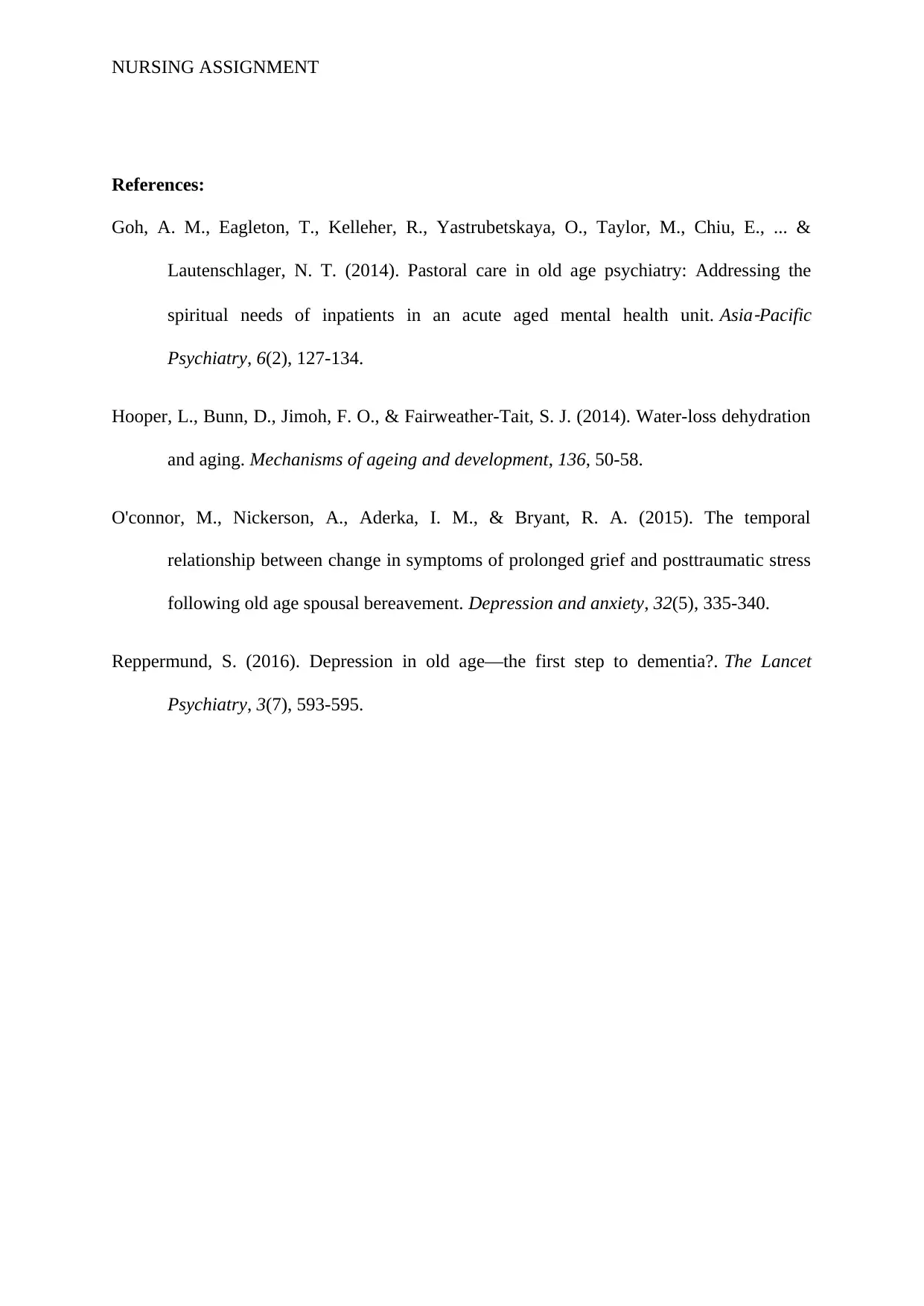
NURSING ASSIGNMENT
References:
Goh, A. M., Eagleton, T., Kelleher, R., Yastrubetskaya, O., Taylor, M., Chiu, E., ... &
Lautenschlager, N. T. (2014). Pastoral care in old age psychiatry: Addressing the
spiritual needs of inpatients in an acute aged mental health unit. Asia
‐Pacific
Psychiatry, 6(2), 127-134.
Hooper, L., Bunn, D., Jimoh, F. O., & Fairweather-Tait, S. J. (2014). Water-loss dehydration
and aging. Mechanisms of ageing and development, 136, 50-58.
O'connor, M., Nickerson, A., Aderka, I. M., & Bryant, R. A. (2015). The temporal
relationship between change in symptoms of prolonged grief and posttraumatic stress
following old age spousal bereavement. Depression and anxiety, 32(5), 335-340.
Reppermund, S. (2016). Depression in old age—the first step to dementia?. The Lancet
Psychiatry, 3(7), 593-595.
References:
Goh, A. M., Eagleton, T., Kelleher, R., Yastrubetskaya, O., Taylor, M., Chiu, E., ... &
Lautenschlager, N. T. (2014). Pastoral care in old age psychiatry: Addressing the
spiritual needs of inpatients in an acute aged mental health unit. Asia
‐Pacific
Psychiatry, 6(2), 127-134.
Hooper, L., Bunn, D., Jimoh, F. O., & Fairweather-Tait, S. J. (2014). Water-loss dehydration
and aging. Mechanisms of ageing and development, 136, 50-58.
O'connor, M., Nickerson, A., Aderka, I. M., & Bryant, R. A. (2015). The temporal
relationship between change in symptoms of prolonged grief and posttraumatic stress
following old age spousal bereavement. Depression and anxiety, 32(5), 335-340.
Reppermund, S. (2016). Depression in old age—the first step to dementia?. The Lancet
Psychiatry, 3(7), 593-595.
1 out of 6
Related Documents
Your All-in-One AI-Powered Toolkit for Academic Success.
+13062052269
info@desklib.com
Available 24*7 on WhatsApp / Email
![[object Object]](/_next/static/media/star-bottom.7253800d.svg)
Unlock your academic potential
© 2024 | Zucol Services PVT LTD | All rights reserved.
